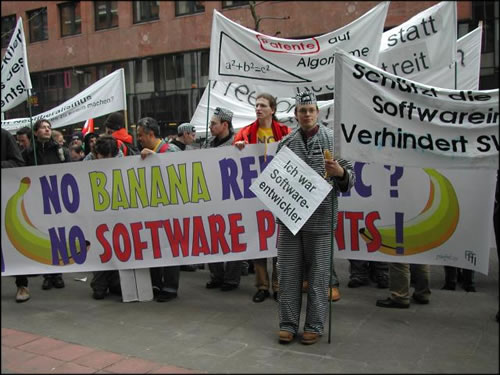Patent nonsense: the case for unfettered development


The Computer Implemented Inventions Directive (CIID) has caused considerable controversy ever since it started passing through the corridors of the European Union in 2002. But understanding the directive, the legislative processes involved and the consequences for the software industry is a mind boggling task.
Let's be clear about what we mean by software patents. The argument revolves around the question of whether or not we should be able to patent physical inventions that use software -- such as a car braking system -- and whether or not we should be able to patent software itself. Most anti-patent groups accept that the former should be patentable, whilst the latter shouldn't. For small and medium enterprises (SMEs), who make up the majority of the industry, patents on pure software would be a disaster. But for some big businesses they are a lucrative prize.
Consider the implications for a moment. Software ideas as trivial as converting Windows 95 filenames to Windows NT filenames are being patented in the EU already. If the CIID passes through and legalises these software patents, every business would need to hire lawyers to track patents to avoid infringement. But this would be a near-impossible task given the number and trivial nature of so many patents -- imagine trying to write software without a progress bar, menu tabs or certain kinds of multitasking! Avoiding this will represent an unnecessary distraction from the business of writing software, which is already lucratively protected by copyright law.
If legalised, it will be practically impossible for developers to avoid software patent infringement. The alternative is to build a defensive portfolio of software patents, so that if a big business accuses you of infringement you can negotiate your way out of expensive legal procedures with cross-licensing deals. These costs, however, would inevitably be passed onto the consumer.
Companies like Acacia Research who "develop, acquire and license" software patents will prosper without ever writing a line of code. They could sue for infringement on software they never invented, and would be immune from countersuits.
Patents, or state-granted monopolies, were originally introduced to protect physical inventions; they are not suitable for ideas, mathematical algorithms or code. Big business and patent portfolio companies, would effectively be able to stifle competition and innovation in the SME sector. According to research by the Green-EFA group, a parliamentary group made up of the Greens and the European Free Alliance, 43 percent of all the software patents currently registered are owned by only 50 companies, most of which are American or Asian.

'I was a software developer'
Photo Credit: FFII
European Complexity
The process of the directive through the European Union's institutions may seem convoluted. Under the co-decision rules for European lawmaking, the European Parliament, Commission and the Council all have to agree to the text of the directive before it can come into force. The Parliament passed a first reading in September 2003 which made it clear with lengthy legalese that software should not be patentable.
Since then, the directive has been under discussion in the Council, whose working version -- drafted by the Commission -- removes all of Parliament's significant amendments and inserts new articles which opponents claim leave dangerous patent loopholes. The Council is due to adopt this version as its common position soon, having been delayed so far by Poland, which disagrees with the Council's position but which is also under diplomatic pressure in other policy areas such as agriculture.
Angry at the intransigence of the Commission and Council, the Parliament's Committee for Legal Affairs (JURI) voted for a restart of the entire procedure on 2 February, a decision the Commission is free to ignore, even though it was ratified by the Council of Presidents on 17 February. Whether a restart will happen, or the Council will adopt a dangerous common position before a restart is possible, depends on a bewildering range of formalities and meetings.
Key Players
Many of the key players have exploited this confusion to further their interests. Malcolm Harbour, Conservative MEP for the West Midlands and the chosen party expert on the issue, claims that there is no significant difference between the current Council version and Parliament's version of September 2003. JURI's vote earlier this month suggests that his position is a smokescreen that hides the Commission's real intentions: to make software patentable.
Not all of the UK Conservative MEPs share Harbour's cut and dried approach -- several of them were extremely concerned when we explained the issue to them in person. But, as with Labour and the Liberal Democrats, most Conservative MEPs vote on the advice of their party expert. All three parties have been broadly in favour of software patents going by their voting record leaving the Greens, Plaid Cymru, the SNP and UKIP to staunchly oppose them in the UK.
Anti-patent campaigners take to the streets to get their voices heard
Photo Credit: FFII
Be in no doubt: big business is pushing hard for software patents. One of their front groups, the Campaign for Creativity, previously lobbied for gene patents and argues for strong intellectual property rights without consideration of their impact on SMEs. Lobbyists, working on behalf of corporates, have permanent access to MEPs, which is unavailable to SMEs. Bill Gates arranged a special meeting with over 60 MEPs on the day that we were in Parliament trying to arrange meetings with a few of our constituent MEPs. Another industry lobby group Intellect, who claim to speak for SMEs, actually represent the likes of Microsoft and Nokia (who have been publicly pushing for software patents, along with many other large businesses).
The future for SMEs
Standing against this well-financed lobbying machine is a loose collection of non-profit associations, SMEs and individuals. The largest grouping, the Foundation for a Free Information Infrastructure, has the registered support of more than 500 members, 1,200 companies and 75,000 supporters. With the backing of some of the fringe political parties in Europe, and studies by the likes of Deutsche Bank, who say that SMEs "would be most adversely affected by patentability", they convinced Parliament in September 2003 and continue to hold the attention of many MEPs.
Expecting SMEs to track the process of the legislation and contribute their input in a timely and accurate manner is ludicrous. Understanding complexity of the procedures, the arguments over terminology and their legal implications is a huge job. Robert Osfield, owner of OpenSceneGraph Professional Services, a small Scottish computer graphics consultancy, commented that "the fact the patents nonsense has to take up any of my time at all is galling, but it's the single greatest threat to my livelihood".
Osfield's advice to other IT professionals in SMEs is "to take all that the DTI and UKPO say with a pinch of salt, to do your own review of the impact of software patents on your business, and to get behind groups like the FFII (Foundation for a Free Information Infrastructure) who can help you represent your interests most effectively". Most MEPs are very receptive to intelligent approaches from constituent SMEs, and arranging meetings isn't all that difficult. The CIID affects the livelihood of every SME in the IT sector, so we should take it seriously.
The authors of this piece are anti-patent campaigners and have worked with groups including the Foundation for a Free Information Infrastructure.
Anti-patent campaigners protesting outside EU offices in Brussels
Photo Credit: FFII